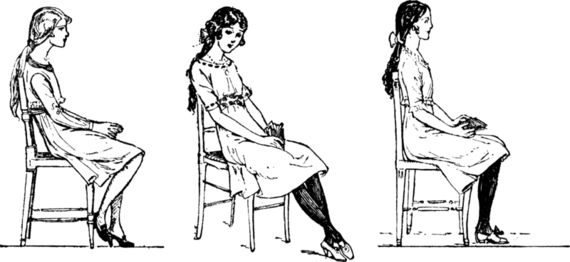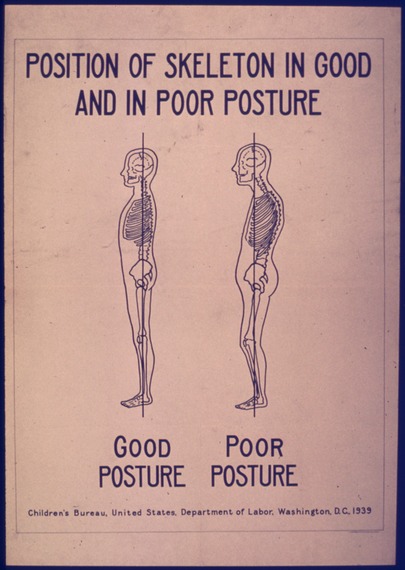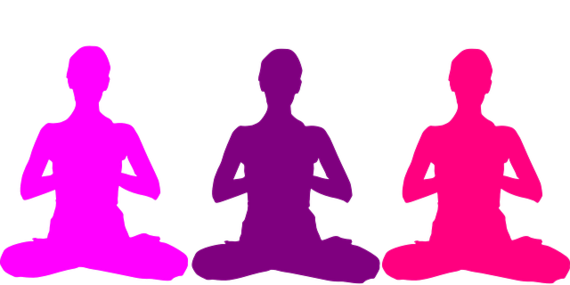Coping with Stress
Remember when your mother told you to "sit up straight?" Apart from what your mother may have considered proper decorum, good posture appears to have many surprising mental health benefits. A recent breakthrough study coming from The University of Auckland concluded that sitting with an upright posture can function as a coping mechanism against stress. The researchers asked participants to complete several questionnaires assessing their affect/mood, self-esteem and arousal levels after performing a task designed to induce mild stress. During the task, the participants were randomly assigned to one of two posture conditions. One group was instructed to sit in upright posture, while the other was instructed to sit in a slumped position. In order to reduce expectation effects - i.e., the idea that knowing the purpose of an experiment might influence behavior - the researchers told participants a fictitious cover story that the experiment was supposedly investigating the effects of a technique used by physical therapists. At the end of the trial, the participants were debriefed on the true purpose of the study.
By the end of the stress-inducing task, participants sitting in an upright posture displayed an overall more positive emotional state compared to those in the slumped posture group. Specifically, the upright position group reported higher self-esteem, as well as "feeling more enthusiastic, excited, and strong, while the slumped participants reported feeling more fearful, hostile, nervous, quiet, still, passive, dull, sleepy, and sluggish." So how exactly does posture affect our ability to cope with stress? The study's researchers posit that the explanatory mechanism behind their findings might have something to do with arousal and what cognitive scientists are now calling "embodied cognition." Namely, the upright condition group exhibited an increase in physiological arousal, i.e. a spike in pulse pressure and cardiac output, which enabled an active coping response to stress. Conversely, a slumped back posture, leading to lower levels of arousal, likely prompted participants in that condition to become more susceptible to stress, dealing with it passively and exhibiting more of a helplessness-type response.
Embodied cognition essentially describes the interrelationship between mind and body, in other words, how bodily experiences can affect cognitive and emotional states, and vice versa. Here, the researchers theorize that as the brain receives muscular and hormonal signals with information about bodily posture, it then translates those signals into emotions. Think about it like this: "If I'm feeling sad and stressed, I am more likely to sit in a slumped position. And if I'm sitting in a slumped position, I am more likely to be sad and stressed." At the same time, because this study did not include a more 'neutral' posture group, there is no way to tell whether slumped posture is producing negative effects or upright posture is producing positive effects. More research is required to answer this question, in addition to other intriguing questions regarding the practical applications of these findings, and the implications for particular populations, for example people suffering from depression or people prone to negative thought patterns.
Posture, Depression and Memory
Meanwhile, clinical psychologists at the University of Hildesheim and the Ruhr University Bochum, in Germany, recently published a study titled "Sitting Posture Makes a Difference--Embodiment Effects on Depressive Memory Bias." This small study recruited 30 psychiatric inpatients formally diagnosed with major depressive disorder to investigate the effects of posture on memory. For the memory task, the researchers showed participants 16 positive (e.g. "beauty") and 16 negative words (e.g. "exhaustion") on a computer screen, and then asked them to imagine themselves in a visual scene connected to each word, for example imagining themselves in a scene surrounded by beauty, or feeling exhausted. The participants completed the task sitting in either a slumped or upright position. About 5 minutes after the imagination task, they were asked to recall as many words as possible.
The results show that depressed patients sitting with a slumped posture had a tendency to recall more negative than positive words compared to the upright-sitting group. On the other hand, depressed patients in the upright-sitting group exhibited more balanced memory for both the negative and positive words. Here, it is important to note that previous psychological literature has established that depressed patients generally have a memory bias for negative material. Could maintaining straight posture be an effective method of attenuating the negative memory bias in depressed patients? Perhaps. It is still unclear how and in what direction movement and posture patterns play a role in the etiology of depression. However, clinicians speculate that depressed patients might be more likely to develop habits of sitting positions (e.g. slumped) that self-perpetuate negative cognitive feedback loops. What we are learning is that research on posture or other bodily manipulations might have important applications in therapeutic interventions for depressive disorders. The researchers suggest that cognitive-behavioral therapy aimed at training clinically depressed patients to become more aware of their bodies and mindful about posture might positively regulate processing biases that are involved in major depressive disorder.
Metacognition
Overall, a large body of converging research seems to be pointing to the notion that body posture can affect our minds in multiple, complex ways. Cognitive psychologists have even reported that body posture can affect so-called "meta-cognitive" processes, that is, how we think about our thoughts and beliefs. Researchers at Ohio State University and the Autonomous University in Madrid, Spain, examined the relationship between metacognition and body posture, and found differences in how participants evaluated their own abilities and judgments depending on whether they were sitting in a "confident" versus a "doubtful" posture. They defined "confident" posture as sitting up with a straight back, and the chest pushed out, while "doubtful" posture was defined as sitting slouched forward with the face looking toward the knees. Their experimental results showed that participants sitting with "confident" posture truly felt more confident about themselves, and held more positive self-attitudes when evaluating themselves as potential professionals. The conclusions of this study highlight the role of posture on self-validation and self-perception.
Nature versus Nurture
So how exactly do we develop "good" or "bad" posture? According to one line of medical research, posture is just another trait that comes in variations with different genetic and environmental predispositions across the human population. There even seems to be an intricate relationship between body posture and personality type, with "ideal" posture more closely correlated with extroverted personalities, and introverts being more likely to suffer from poor posture. Extraverted characteristics such as excitability and higher energy levels might be related to the fact that an upright posture can improve breathing, leading to increased blood-oxygen levels and subsequently relieving muscular tension. In the same way we are born with predispositions to specific personality traits and mental states, the way we move and carry our bodies also largely depends on innate and learned tendencies that are unique to every individual.
This growing area of psycho-physiological research on posture is illuminating the potential for change and mental health improvement through the simple act of becoming mindful and paying attention to how we position our bodies. When so many of us spend countless hours bending over a desk every day, reminding ourselves to not slouch could be an easy self-care technique that functions as a coping mechanism against daily stress, and can also boost our mood and self-esteem.
It seems that the old cliché "fake it until you make it" might have some scientific merit in teaching ourselves to walk, stand and sit more confidently. Reminding yourself to maintain an upright posture during a job interview could do more than just give your interviewer the impression that you are confident - it can likely make you truly feel and hence act more so. For an introvert trying to navigate social situations that demand extraverted qualities, it might be helpful to habituate oneself to an upright, 'extraverted' posture during those times. Finally, apart from mindfulness, the best way to tangibly improve posture (and gain the mental health benefits that come with it) is to strengthen the back muscles by choosing exercises like yoga, tai chi and dance that target the appropriate areas. At the end of the day, who we want to be and how we want to feel is partly a product of our posture - and an upright, 'ideal' posture is not difficult to attain.



